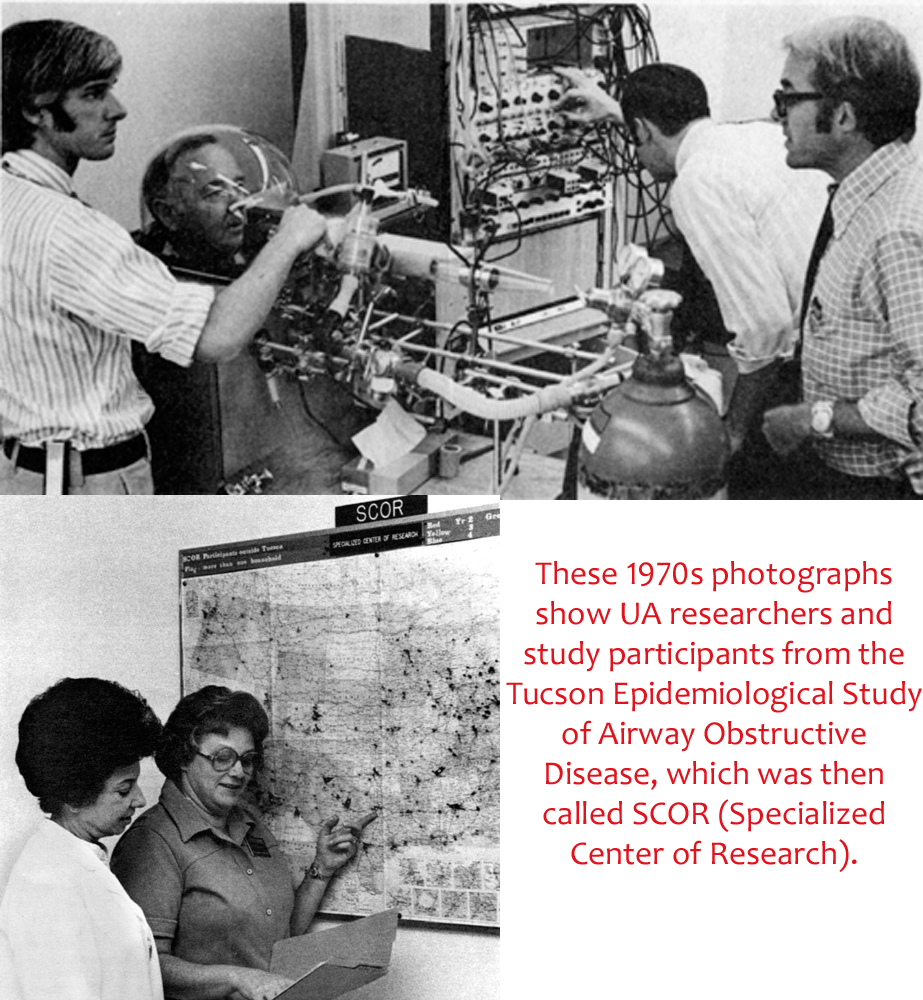UA Study Plays Key Role in International Lung Research
 |
A long-running University of Arizona respiratory study of thousands of Tucson volunteers that began in 1972 continues to yield results and may hold the key to conquering Chronic Obstructive Pulmonary Disease (COPD), the fourth-leading cause of death in the United States.
Arizona Respiratory Center researcher Stefano Guerra, MD, PhD, has won a two-year grant from the National Institutes of Health to confirm his preliminary findings that levels of specific proteins in the blood can predict the onset of COPD years before symptoms arise.
Dr. Guerra identified these protein biomarkers in blood samples collected over the 33 years of the Tucson Epidemiological Study of Airway Obstructive Disease (TESAOD) study. More than 9,000 blood samples from TESAOD study participants still are stored at the UA.
In addition to providing blood samples, Tucson study participants were tested every two years for respiratory function. For decades, study coordinators followed their health status and for those who died, they recorded date and cause of death.
“These blood samples, and the health and mortality data collected over many years, are an incredible resource,” said Dr. Guerra, who also holds appointments in the UA’s Mel and Enid Zuckerman College of Public Health and the Southwest Environmental Health Sciences Center. “The Tucson study in many aspects is unique because it was one of the longest-running respiratory studies ever conducted.”
 |
Tucsonan Mark Cesnik, 60, remembers volunteering with his parents to participate in the study back when he was in high school. Research nurses followed his family’s respiratory health for years in clinic visits and questionnaires.
“I remember they had a U.S. map on the wall, with pins showing where all the study participants were now living. They would have to track these people. They were very conscientious,” he recalled.
Now that data is aiding scientists in a worldwide effort to find cures to a variety of lung diseases, from COPD to lung cancer to asthma. Led by the National Heart, Lung and Blood Institute, the effort is known as the CADET study (Centers for Advanced Diagnostics and Experimental Therapeutics in Lung Diseases).
As part of his $900,000 CADET grant over the next two years, Dr. Guerra will test blood samples collected in Switzerland to see if he can replicate his COPD biomarker findings from the Tucson study. He also will take a closer look at the Tucson data to see if and how biomarker levels change over time as COPD develops and progresses over the years. “Understanding the molecular changes may be our best hope for prevention and possibly, drugs to interrupt the progression of the disease,” he said.
In a later phase of the CADET study, Dr. Guerra hopes to test his findings in a clinic setting, using the biomarkers to identify patients at high risk of having rapid disease progression and developing strategies to defer or prevent this debilitating lung disease.
“This study is important because it puts the UA at the center of research that is going on globally,” said Fernando Martinez, MD, director of the Arizona Respiratory Center and the UA’s BIO5 Institute. “This is what translational medicine is all about – taking the findings of basic science and turning it into medical diagnostics and therapies that improve the lives of patients. It’s not some myth or dream -- this is happening today.”
Dr. Guerra said he’s grateful for the dedication of the TESAOD participants over the many years of the study and for the foresight of the Tucson study founders, particularly the late UA scientist Benjamin Burrows, MD. “It took vision back in the 1970s to collect this data and blood samples from thousands of participants and store them with the hope that someday future scientists would be able to decode their meanings with technologies not yet invented.”
About the Arizona Respiratory Center
The Arizona Respiratory Center is a center of excellence at the University of Arizona College of Medicine -- Tucson. Internationally known for its research into the causes and development of emphysema, chronic bronchitis and asthma, the Arizona Respiratory Center brings together experts in immunology, epidemiology, genetics, pathology, radiology, internal medicine, pediatrics, pharmacology, computer science and many other disciplines to attack respiratory disease in children and adults.

